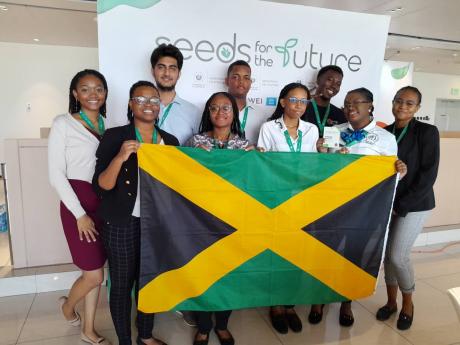Jamaican students shine at tech summit
Last weekend, Huawei and UNESCO wrapped up another successful Latin America and the Caribbean Seeds for the Future 2024 Summit.
The event, that was held in El Salvador from August 25 to 31, saw 132 youths putting into practice their innovation and creating sustainable technological solutions. Among the group were nine Jamaicans who represented the University of Technology (UTech) and The University of the West Indies (UWI). The Jamaican teams were the only ones from the English-speaking Caribbean that made it to the top 10 of the competition aspect of the summit, with the UWI being placed among the top three. Team UWI created an electro mat that harnesses energy from mechanical stress - it basically uses the mechanical movements of people and vehicles to generate electricity.
"The idea is to hopefully reduce electricity costs and also giving money back to the customers. So simple solutions can help to reduce poverty and increase our overall quality of life," said Daniel Palmer of Team UWI. Their project shared the third-placed spot with Guatemala and El Salvador and Team UWI also walked away with the most innovative award. While they were not selected to travel to China for the finals, he said the electro mat and the knowledge gained will be super beneficial to Jamaica's growth.
"Huawei taught us how to pitch a business, so going home, I can help others and show them to properly market an idea," said Palmer, a past of student of Jamaica College where he participated in robotic competitions.
"So that is where I got my passion from. I decided to continue that journey at UWI and I learned a lot during the three years there. I have friends have gone on the Tech4Good programme before and I thought it would be a nice experience. I have learnt a lot during my stay in El Salvador as it relates to AI (artificial intelligence) and cultures so when I am going back to solve problems I can have a wider view because I have experienced more than Jamaica," he said.
The UTech batch also captured the judges' attention with their project KETCH, which can help commuters keep track - via a text message - of the movement of the buses on their routes.
Seeds for the Future aims to share ICT knowledge with young students by showing them how it is applied and how the industry works. Since its launch in 2014 in Latin America, the programme has trained more than 2,100 students from 20 countries, providing training in cutting edge technology and promoting an enriching cultural exchange. Vice President of Huawei Latin America and the Caribbean, Michael Xue, said so far, the company has invested more than US$10 million in the programme.
"We have helped more than 300,000 people from more than 20 countries in the region to improve their digital skills. Over the next three years UNESCO and Huawei will launch new strategic cooperation in the region focusing on the development of digital talent in ICT. This is part of our ongoing efforts to help cultivate broader digital development and we hope these efforts will benefit 3000 more students and young people," he said
During the closing ceremony, El Salvador's Vice President Felix Ulloa spoke about the success of technological and educational innovation projects.
"We are in the middle of a digital era, for this reason, President [Nayib] Bukele made a promise six years ago to promote technological development in El Salvador. Our next generation of students will be 100-per-cent digital native since they are educated with an innovative system with artificial intelligence," he said.






































